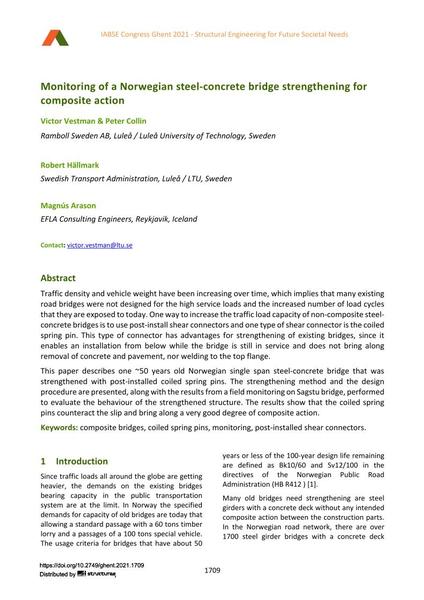Monitoring of a Norwegian steel-concrete bridge strengthening for composite action

|
|
|||||||||||
Bibliografische Angaben
| Autor(en): |
Victor Vestman
(Ramboll Sweden AB, Luleå / Luleå University of Technology, Sweden)
Peter Collin (Ramboll Sweden AB, Luleå / Luleå University of Technology, Sweden) Robert Hällmark Magnús Arason (EFLA Consulting Engineers, Reykjavik, Iceland) |
||||
|---|---|---|---|---|---|
| Medium: | Tagungsbeitrag | ||||
| Sprache(n): | Englisch | ||||
| Tagung: | IABSE Congress: Structural Engineering for Future Societal Needs, Ghent, Belgium, 22-24 September 2021 | ||||
| Veröffentlicht in: | IABSE Congress Ghent 2021 | ||||
|
|||||
| Seite(n): | 1709-1717 | ||||
| Anzahl der Seiten (im PDF): | 9 | ||||
| DOI: | 10.2749/ghent.2021.1709 | ||||
| Abstrakt: |
Traffic density and vehicle weight have been increasing over time, which implies that many existing road bridges were not designed for the high service loads and the increased number of load cycles that they are exposed to today. One way to increase the traffic load capacity of non-composite steel- concrete bridges is to use post-install shear connectors and one type of shear connector is the coiled spring pin. This type of connector has advantages for strengthening of existing bridges, since it enables an installation from below while the bridge is still in service and does not bring along removal of concrete and pavement, nor welding to the top flange. This paper describes one ~50 years old Norwegian single span steel-concrete bridge that was strengthened with post-installed coiled spring pins. The strengthening method and the design procedure are presented, along with the results from a field monitoring on Sagstu bridge, performed to evaluate the behaviour of the strengthened structure. The results show that the coiled spring pins counteract the slip and bring along a very good degree of composite action. |
||||
| Stichwörter: |
Verbundbrücken Monitoring
|
||||
| Copyright: | © 2021 International Association for Bridge and Structural Engineering (IABSE) | ||||
| Lizenz: | Die Urheberrechte (Copyright) für dieses Werk sind rechtlich geschützt. Es darf nicht ohne die Zustimmung des Autors/der Autorin oder Rechteinhabers/-in weiter benutzt werden. |
||||
